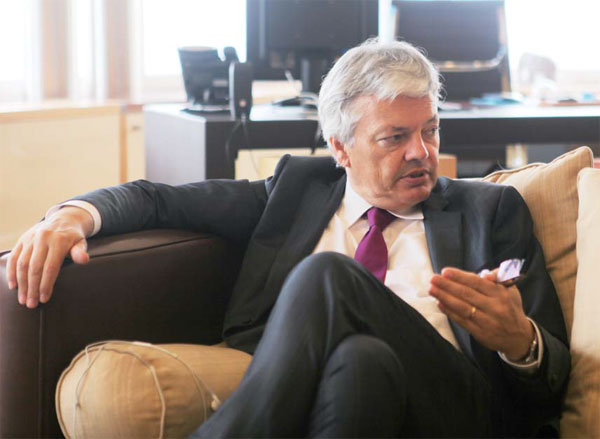China's 'real progress' on climate change
As crucial meeting in paris looms, Belgium's deputy pm praises China's attitude and progress
Didier Reynders, deputy prime minister of Belgium, is impressed with the way China is talking domestic and global problems.
Reynders, who is also Belgium's minister of foreign and European affairs and foreign trade, says he has come to this conclusion through his close encounters with top Chinese officials, especially when arranging President Xi Jinping's visit to Belgium in 2014, King Phillipe's tour to China and Premier Li Keqiang's visit to Belgium this year.
|
Didier Reynders says he is impressed with Beijing's proactive attitude of doing more to tackle domestic and global challenges. Gao Shuang / China Daily |
"Of course, we have signed many contracts and agreements (at a bilateral level). But I was impressed by the commitment taken by Beijing to say: "Yes, we need to do more," Reynders says in an interview with China Daily at his Ministry of Foreign Affairs office in Brussels.
Reynders, who has been deputy prime minister since 2004, says the king had personally chosen to go to China. It was his first state visit after ascending to the throne in 2013, although he had previously visited China in 1986, when he was prince of Belgium. The king's visit to China and Li Keqiang's tour to Belgium led to the signing of about 100 agreement and documents between the two countries, according to Reynders.
In June, following Premier Li's visit to Belgium and his meeting with European Union leaders, China and the EU agreed to work more closely together in fighting climate change.
The international community is seeking to reach a globally binding deal on climate change at the end of this year at a United Nations summit in Paris.
Beijing has a pollution problem that is severe and visible, says Reynders. "But we have sensed a real willingness from Chinese authorities to try to fight pollution in the country and fight climate change at a worldwide."
In 2009, when the UN held its climate summit in Copenhagen, China was blamed for the lack of a substantial deal. Reynders says China has demonstrated a willingness to take action since then.
"Of course we try to come up with different binding solutions for partners. I know that it needs to take some time for China to reach the commitment of realizing carbon peak," says Reynders.
"For the moment, prior to the Paris summit, it is very impressive, in comparison with the previous meeting in Copenhagen. It's a clear signal that there is a real willingness to do more."
Beijing and Washington signed a strategic agreement in 2014 to cooperate on curbing greenhouse gas emissions globally.
The deal, announced in the Great Hall of the People in Beijing, saw China agreed to cap its output by 2030 or earlier if possible. Previously China had only pledged to reduce the growth of emissions. In the Beijing agreement it said it would increase its use of energy from zero-emission sources to 20 percent by 2030. The United States promised to cut its emissions by up to 28 percent below 2005 levels by 2025.
"So it is time to deliver. And it is very clear that we have real progress from China about climate change," says Reynders.
He says China must be involved at an international level because it has developed so much in the past few decades, especially in the field of technology, and that China can also share its expertise on alleviating poverty. This insight would help the wider international community with its work on the Millennium Development Goals and the Post-2015 Development Agenda.
"We have seen a lot of discussions about how to lift more people out of poverty. China has done this and it's important that it brings this expertise to the table."
China can also draw on its knowledge of working in African countries to help Belgians with the social and economic development of the continent.
"So we are open to try and discuss this with Chinese colleagues. We have a project in Kinshasa for a transport system in the city. But due to the internal situation in Congo, it was impossible to follow it through. So we have to have good collaboration to promote investment in Asia and Europe, but also in a third continent like Africa."
Belgium decided to join the Asian Infrastructure Investment Bank, a sign it is interested in cross-border collaboration on investment and development.
"First we took the principle decision to become a member, and now we are in discussion about the kind of partnership and collaboration," he says.
Reynders says the focus for the Belt and Road Initiative should be linking Antwerp with China by cargo rail. "From there it may be possible to start discussions about public transport," says Reynders, who used to be in charge of Belgium's railway system.
"And why not one day, a high speed train that directly links Beijing and Brussels, like what we currently have between Brussels and London?"
He says China and the EU should set up a common fund that connects China's Belt and Road Initiative with the European Union's 315 million euro ($353 million) investment plan, which was launched in July to kick-start the continent's economy. There should also be greater collaboration in banking and finance, he says.
He suggests China could learn from international standards on banking and stock market regulations, in light of months of stock market turbulence, so it can better play a major role on the world stage. Making the renminbi fully convertible will also aid China's global economic expansion. Shanghai is the site for a pilot free trade zone.
"Of course the challenge will be managing the expertise and experiment in Shanghai and then translating that nationally. I understand how difficult that would be to do that with 500 million residents in Europe, it would be harder to do it with 1.4 billion."
Gao Shuang contributed to the story.
fujing@chinadaily.com.cn



















